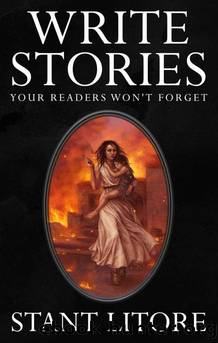WRITE STORIES YOUR READERS WON'T FORGET by LITORE STANT

Author:LITORE, STANT [LITORE, STANT]
Language: eng
Format: epub
Publisher: Westmarch Publishing
Published: 2022-02-24T05:00:00+00:00
Everâ man wants life to be a fine thing, and a easy. âTis fine, boy, powerful fine, but âtainât easy. Life knocks a man down and he gits up and it knocks him down agin.
Ellison, on the other hand, is not telling âever manâsâ story. The narrator of Invisible Man is not everyman; his experience is not universal, but is particular to black men, or to some black men, or even to one black man. He is a person who is marginalized, humiliated, and ultimately rendered invisible by the dominant cultureâunless he can tell his story in a way that others can hear it. Pennyâs âever manâ is inescapably visible and evident, but Ellisonâs narrator would be unseen if he did not collide with us and force us to look at the pressures under which he lives. Because he must assert his existence, Ellisonâs narrator defines the keyword and key metaphor of the book on its first page, then devotes the following five hundred pages to convincing those of us who have not shared his experience how real it is. Where Rawlingâs tale can conclude with a thematic statement that the reader will accept largely unquestioned, Ellison anticipates the white reader being resistant to his or reluctant to consider it; he cannot take it for granted that the reader will accept his conclusion if it is left until the final page. So he lays it all out up front and then sets about the work of showing the reluctant reader just why that thematic statement has been earned.
Neither strategy is inherently better; each is suited to the particular thematic questions of the bookâand to the authorâs assessment of how ready and willing the reader may be to engage with those thematic questions. As you think about your own story, how âuniversalâ or âcontroversialâ do you anticipate your thematic questions will be? When your thematic concerns come up, are some of your readers likely to be âsleepwalkersâ like those Ellison mentions, who may not recognize or respect your theme? How and when you present the thematic concern to the readerâhow directly or indirectly, how aggressively or gentlyâcan be shaped by what kind of journey you think you can take the reader along on. What preparation do they need, if any, to engage with the central concerns of your book, script, or short story? Thatâs worth asking yourself and thinking about very intentionally.
The choice of keyword may reflect this, as well. Rawlingâs metaphor of the yearling speaks to the presumed universality of her theme (coming of age); every spring, we look around us and see yearlings and blossoming plants and signs of youth. The metaphor is familiar. Ellisonâs invisible man is a less familiar apparition; we donât encounter invisible men in our daily lives, or we are not aware that we do. The metaphor is striking, an anomaly, something that requires immediate explanation, something thatâironicallyâcannot be taken for granted or overlooked once it is mentioned.
Download
This site does not store any files on its server. We only index and link to content provided by other sites. Please contact the content providers to delete copyright contents if any and email us, we'll remove relevant links or contents immediately.
| Publishing & Books | Research |
| Writing |
Asking the Right Questions: A Guide to Critical Thinking by M. Neil Browne & Stuart M. Keeley(5745)
Autoboyography by Christina Lauren(5221)
Eat That Frog! by Brian Tracy(4507)
Dialogue by Robert McKee(4379)
Sticky Fingers by Joe Hagan(4179)
Journeys Out of the Body by Robert Monroe(3607)
Annapurna by Maurice Herzog(3458)
Full Circle by Michael Palin(3435)
Schaum's Quick Guide to Writing Great Short Stories by Margaret Lucke(3368)
Elements of Style 2017 by Richard De A'Morelli(3336)
The Art of Dramatic Writing: Its Basis in the Creative Interpretation of Human Motives by Egri Lajos(3054)
Atlas Obscura by Joshua Foer(2942)
Why I Write by George Orwell(2941)
The Diviners by Libba Bray(2924)
The Fight by Norman Mailer(2919)
In Patagonia by Bruce Chatwin(2914)
The Mental Game of Writing: How to Overcome Obstacles, Stay Creative and Productive, and Free Your Mind for Success by James Scott Bell(2893)
Venice by Jan Morris(2561)
The Elements of Style by William Strunk and E. B. White(2463)
